Refine search
No keyword found to refine search
keywords EN
Places
Names
620 documents found
| 1 | 11 |
Documents per page :

November 2016, Evacuation of the Calais "Jungle
Michael Bunel / Le Pictorium
LePictorium_0286323.jpg
Forces de l'ordre cordon off camp accesses as refugees await evacuation. Buses chartered by the prefecture are due to take the exiles to reception centers. According to the associations on site (HRO and Utopia 56), people had two choices: get on the bus or have to deal with the PAF (border police). November 16, 2021. Grande Synthe.
November 2016, the "jungle" of Calais, the largest shantytown in Europe, was evacuated. Five years later, the exiles on the road to Great Britain are still there and camps are regularly created between Calais and Grande-Synthe. The only new thing is that the police dismantle them every two to three days to avoid the creation of a new "jungle". A tried and tested method, despite the health crisis, which "works" in the eyes of the authorities, who again expelled hundreds of migrants from Grande-Synthe on Tuesday. But it does not make the exiles disappear. Five years after the "jungle", the situation has not changed so much. On the contrary, living conditions have further deteriorated and the generalization of passages and the ensuing dramas have multiplied. The state of affairs is appalling. The dialogue between the associations and the prefecture does not find its way, while the exiles are relentlessly chased, wherever they are. A precarious situation that does not facilitate the collection of testimonies, so great is the suspicion among the candidates for exile.
November 2016, the "jungle" of Calais, the largest shantytown in Europe, was evacuated. Five years later, the exiles on the road to Great Britain are still there and camps are regularly created between Calais and Grande-Synthe. The only new thing is that the police dismantle them every two to three days to avoid the creation of a new "jungle". A tried and tested method, despite the health crisis, which "works" in the eyes of the authorities, who again expelled hundreds of migrants from Grande-Synthe on Tuesday. But it does not make the exiles disappear. Five years after the "jungle", the situation has not changed so much. On the contrary, living conditions have further deteriorated and the generalization of passages and the ensuing dramas have multiplied. The state of affairs is appalling. The dialogue between the associations and the prefecture does not find its way, while the exiles are relentlessly chased, wherever they are. A precarious situation that does not facilitate the collection of testimonies, so great is the suspicion among the candidates for exile.

November 2016, Evacuation of the Calais "Jungle
Michael Bunel / Le Pictorium
LePictorium_0286331.jpg
The Slack dunes near Wimereux. According to the Préfecture Maritime 12,000 attempts were made between January and July 2021 last year. This compares with 2,294 attempts in 2019. November 17, 2021. Wimereux.
November 2016, the "jungle" of Calais, the largest shantytown in Europe, was evacuated. Five years later, the exiles on the road to Great Britain are still there and camps are regularly created between Calais and Grande-Synthe. The only new thing is that the police dismantle them every two to three days to avoid the creation of a new "jungle". A tried and tested method, despite the health crisis, which "works" in the eyes of the authorities, who again expelled hundreds of migrants from Grande-Synthe on Tuesday. But it does not make the exiles disappear. Five years after the "jungle", the situation has not changed so much. On the contrary, living conditions have further deteriorated and the generalization of passages and the ensuing dramas have multiplied. The state of affairs is appalling. The dialogue between the associations and the prefecture does not find its way, while the exiles are relentlessly chased, wherever they are. A precarious situation that does not facilitate the collection of testimonies, so great is the suspicion among the candidates for exile.
November 2016, the "jungle" of Calais, the largest shantytown in Europe, was evacuated. Five years later, the exiles on the road to Great Britain are still there and camps are regularly created between Calais and Grande-Synthe. The only new thing is that the police dismantle them every two to three days to avoid the creation of a new "jungle". A tried and tested method, despite the health crisis, which "works" in the eyes of the authorities, who again expelled hundreds of migrants from Grande-Synthe on Tuesday. But it does not make the exiles disappear. Five years after the "jungle", the situation has not changed so much. On the contrary, living conditions have further deteriorated and the generalization of passages and the ensuing dramas have multiplied. The state of affairs is appalling. The dialogue between the associations and the prefecture does not find its way, while the exiles are relentlessly chased, wherever they are. A precarious situation that does not facilitate the collection of testimonies, so great is the suspicion among the candidates for exile.

November 2016, Evacuation of the Calais "Jungle
Michael Bunel / Le Pictorium
LePictorium_0286333.jpg
Men talking to each other as the evacuation of the camp begins. A camp of over 1,000 people, mostly Kurds and Iraqis, had taken up residence in the shopping area of the Auchan store in Grande Synthe. The prefecture ordered the dismantling of the camp this morning. The exiles were not notified in accordance with the government's undertakings. November 16, 2021. Grande Synthe. France.
November 2016, the "jungle" of Calais, the largest shantytown in Europe, was evacuated. Five years later, the exiles on the road to Great Britain are still there and camps are regularly created between Calais and Grande-Synthe. The only new thing is that the police dismantle them every two to three days to avoid the creation of a new "jungle". A tried and tested method, despite the health crisis, which "works" in the eyes of the authorities, who again expelled hundreds of migrants from Grande-Synthe on Tuesday. But it does not make the exiles disappear. Five years after the "jungle", the situation has not changed so much. On the contrary, living conditions have further deteriorated and the generalization of passages and the ensuing dramas have multiplied. The state of affairs is appalling. The dialogue between the associations and the prefecture does not find its way, while the exiles are relentlessly chased, wherever they are. A precarious situation that does not facilitate the collection of testimonies, so great is the suspicion among the candidates for exile.
November 2016, the "jungle" of Calais, the largest shantytown in Europe, was evacuated. Five years later, the exiles on the road to Great Britain are still there and camps are regularly created between Calais and Grande-Synthe. The only new thing is that the police dismantle them every two to three days to avoid the creation of a new "jungle". A tried and tested method, despite the health crisis, which "works" in the eyes of the authorities, who again expelled hundreds of migrants from Grande-Synthe on Tuesday. But it does not make the exiles disappear. Five years after the "jungle", the situation has not changed so much. On the contrary, living conditions have further deteriorated and the generalization of passages and the ensuing dramas have multiplied. The state of affairs is appalling. The dialogue between the associations and the prefecture does not find its way, while the exiles are relentlessly chased, wherever they are. A precarious situation that does not facilitate the collection of testimonies, so great is the suspicion among the candidates for exile.

November 2016, Evacuation of the Calais "Jungle
Michael Bunel / Le Pictorium
LePictorium_0286334.jpg
The Dunkirk camp is cordoned off by the forces of law and order. Journalists on site this morning announced to the refugees that the camp was to be dismantled. The prefecture had promised to inform the exiles and associations 48 hours in advance. November 16, 2021. Grande Synthe.
November 2016, the "jungle" of Calais, the largest shantytown in Europe, was evacuated. Five years later, the exiles on the road to Great Britain are still there and camps are regularly created between Calais and Grande-Synthe. The only new thing is that the police dismantle them every two to three days to avoid the creation of a new "jungle". A tried and tested method, despite the health crisis, which "works" in the eyes of the authorities, who again expelled hundreds of migrants from Grande-Synthe on Tuesday. But it does not make the exiles disappear. Five years after the "jungle", the situation has not changed so much. On the contrary, living conditions have further deteriorated and the generalization of passages and the ensuing dramas have multiplied. The state of affairs is appalling. The dialogue between the associations and the prefecture does not find its way, while the exiles are relentlessly chased, wherever they are. A precarious situation that does not facilitate the collection of testimonies, so great is the suspicion among the candidates for exile.
November 2016, the "jungle" of Calais, the largest shantytown in Europe, was evacuated. Five years later, the exiles on the road to Great Britain are still there and camps are regularly created between Calais and Grande-Synthe. The only new thing is that the police dismantle them every two to three days to avoid the creation of a new "jungle". A tried and tested method, despite the health crisis, which "works" in the eyes of the authorities, who again expelled hundreds of migrants from Grande-Synthe on Tuesday. But it does not make the exiles disappear. Five years after the "jungle", the situation has not changed so much. On the contrary, living conditions have further deteriorated and the generalization of passages and the ensuing dramas have multiplied. The state of affairs is appalling. The dialogue between the associations and the prefecture does not find its way, while the exiles are relentlessly chased, wherever they are. A precarious situation that does not facilitate the collection of testimonies, so great is the suspicion among the candidates for exile.

November 2016, Evacuation of the Calais "Jungle
Michael Bunel / Le Pictorium
LePictorium_0286335.jpg
Two men smoke a cigarette during the evacuation of the camp. A camp of over 1,000 people, mostly Kurds and Iraqis, had taken up residence in the shopping area of the Auchan store in Grande Synthe. The prefecture ordered the dismantling of the camp this morning. The exiles were not notified in accordance with the government's undertakings. November 16, 2021. Grande Synthe. France.
November 2016, the "jungle" of Calais, the largest shantytown in Europe, was evacuated. Five years later, the exiles on the road to Great Britain are still there and camps are regularly created between Calais and Grande-Synthe. The only new thing is that the police dismantle them every two to three days to avoid the creation of a new "jungle". A tried and tested method, despite the health crisis, which "works" in the eyes of the authorities, who again expelled hundreds of migrants from Grande-Synthe on Tuesday. But it does not make the exiles disappear. Five years after the "jungle", the situation has not changed so much. On the contrary, living conditions have further deteriorated and the generalization of passages and the ensuing dramas have multiplied. The state of affairs is appalling. The dialogue between the associations and the prefecture does not find its way, while the exiles are relentlessly chased, wherever they are. A precarious situation that does not facilitate the collection of testimonies, so great is the suspicion among the candidates for exile.
November 2016, the "jungle" of Calais, the largest shantytown in Europe, was evacuated. Five years later, the exiles on the road to Great Britain are still there and camps are regularly created between Calais and Grande-Synthe. The only new thing is that the police dismantle them every two to three days to avoid the creation of a new "jungle". A tried and tested method, despite the health crisis, which "works" in the eyes of the authorities, who again expelled hundreds of migrants from Grande-Synthe on Tuesday. But it does not make the exiles disappear. Five years after the "jungle", the situation has not changed so much. On the contrary, living conditions have further deteriorated and the generalization of passages and the ensuing dramas have multiplied. The state of affairs is appalling. The dialogue between the associations and the prefecture does not find its way, while the exiles are relentlessly chased, wherever they are. A precarious situation that does not facilitate the collection of testimonies, so great is the suspicion among the candidates for exile.

November 2016, Evacuation of the Calais "Jungle
Michael Bunel / Le Pictorium
LePictorium_0286336.jpg
A family chats around a fire while waiting for the camp to be evacuated by the police. Journalists on the scene this morning announced to the refugees that the camp was to be dismantled. The prefecture had promised to inform the exiles and associations 48 hours in advance. November 16, 2021. Grande Synthe.
November 2016, the "jungle" of Calais, the largest shantytown in Europe, was evacuated. Five years later, the exiles on the road to Great Britain are still there and camps are regularly created between Calais and Grande-Synthe. The only new thing is that the police dismantle them every two to three days to avoid the creation of a new "jungle". A tried and tested method, despite the health crisis, which "works" in the eyes of the authorities, who again expelled hundreds of migrants from Grande-Synthe on Tuesday. But it does not make the exiles disappear. Five years after the "jungle", the situation has not changed so much. On the contrary, living conditions have further deteriorated and the generalization of passages and the ensuing dramas have multiplied. The state of affairs is appalling. The dialogue between the associations and the prefecture does not find its way, while the exiles are relentlessly chased, wherever they are. A precarious situation that does not facilitate the collection of testimonies, so great is the suspicion among the candidates for exile.
November 2016, the "jungle" of Calais, the largest shantytown in Europe, was evacuated. Five years later, the exiles on the road to Great Britain are still there and camps are regularly created between Calais and Grande-Synthe. The only new thing is that the police dismantle them every two to three days to avoid the creation of a new "jungle". A tried and tested method, despite the health crisis, which "works" in the eyes of the authorities, who again expelled hundreds of migrants from Grande-Synthe on Tuesday. But it does not make the exiles disappear. Five years after the "jungle", the situation has not changed so much. On the contrary, living conditions have further deteriorated and the generalization of passages and the ensuing dramas have multiplied. The state of affairs is appalling. The dialogue between the associations and the prefecture does not find its way, while the exiles are relentlessly chased, wherever they are. A precarious situation that does not facilitate the collection of testimonies, so great is the suspicion among the candidates for exile.
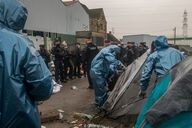
November 2016, Evacuation of the Calais "Jungle
Michael Bunel / Le Pictorium
LePictorium_0286337.jpg
During the dismantling of the Grande Synthe exile camp, a cleaning team uses a knife to slash exiles' tents in full view of the police. A method denounced by associations for several months. November 16, 2021. Grande Synthe.
November 2016, the "jungle" of Calais, the largest shantytown in Europe, was evacuated. Five years later, the exiles on the road to Great Britain are still there and camps are regularly created between Calais and Grande-Synthe. The only new thing is that the police dismantle them every two to three days to avoid the creation of a new "jungle". A tried and tested method, despite the health crisis, which "works" in the eyes of the authorities, who again expelled hundreds of migrants from Grande-Synthe on Tuesday. But it does not make the exiles disappear. Five years after the "jungle", the situation has not changed so much. On the contrary, living conditions have further deteriorated and the generalization of passages and the ensuing dramas have multiplied. The state of affairs is appalling. The dialogue between the associations and the prefecture does not find its way, while the exiles are relentlessly chased, wherever they are. A precarious situation that does not facilitate the collection of testimonies, so great is the suspicion among the candidates for exile.
November 2016, the "jungle" of Calais, the largest shantytown in Europe, was evacuated. Five years later, the exiles on the road to Great Britain are still there and camps are regularly created between Calais and Grande-Synthe. The only new thing is that the police dismantle them every two to three days to avoid the creation of a new "jungle". A tried and tested method, despite the health crisis, which "works" in the eyes of the authorities, who again expelled hundreds of migrants from Grande-Synthe on Tuesday. But it does not make the exiles disappear. Five years after the "jungle", the situation has not changed so much. On the contrary, living conditions have further deteriorated and the generalization of passages and the ensuing dramas have multiplied. The state of affairs is appalling. The dialogue between the associations and the prefecture does not find its way, while the exiles are relentlessly chased, wherever they are. A precarious situation that does not facilitate the collection of testimonies, so great is the suspicion among the candidates for exile.

Exile in the land of human rights
Michael Bunel / Le Pictorium
LePictorium_0286269.jpg
For years, administrative detention centers (CRAs) have been criticized by various associations for the deplorable conditions in which they are held. In an open letter, Forum Réfugiés-Cosi, France Terre d'Asile, SOS Habitat and La Cimade called for the closure of the CRAs as COVID. Some fifty people are still being held at the Mesnil Amelot center, but the Conseil d'Etat has opposed the associations' request for their release. Considered in the same way as prison as a place of deprivation of liberty, the CRAs remain a place of imprisonment prior to expulsion for people illegally present on French territory. In the land of human rights, being a foreigner is a crime. March 15, 2018.
In October 2015, the municipality presented eighteen commitments in a document entitled "Mobilizing the Paris community to welcome refugees". The document opens with this sentence: "Paris, like other refugee cities, will rise to the challenge of welcoming the many migrants currently arriving in Europe." One year on, and with the city of Paris already struggling to fulfill its commitment, the dismantling of the Calais Jungle in October 2016 has led to some refugees retreating to the capital. Camps then sprang up, notably in north-east Paris on the banks of the Canal Saint Martin, then at Porte de la Chapelle and Porte d'Aubervilliers. The dismantling of these camps has continued apace. Since June 2015, 300 evacuations and "shelters" of refugees have taken place in Paris and its inner suburbs. These settlements, followed by their evacuation, give the image of an identical repetition of a catastrophic situation of precariousness and a lack of public action. Invisibilized since the last dismantling operations, the exile populations find themselves rejected on the outskirts of the capital. Only a few associations still manage to maintain contact by seeking out the living quarters of those left behind.
In October 2015, the municipality presented eighteen commitments in a document entitled "Mobilizing the Paris community to welcome refugees". The document opens with this sentence: "Paris, like other refugee cities, will rise to the challenge of welcoming the many migrants currently arriving in Europe." One year on, and with the city of Paris already struggling to fulfill its commitment, the dismantling of the Calais Jungle in October 2016 has led to some refugees retreating to the capital. Camps then sprang up, notably in north-east Paris on the banks of the Canal Saint Martin, then at Porte de la Chapelle and Porte d'Aubervilliers. The dismantling of these camps has continued apace. Since June 2015, 300 evacuations and "shelters" of refugees have taken place in Paris and its inner suburbs. These settlements, followed by their evacuation, give the image of an identical repetition of a catastrophic situation of precariousness and a lack of public action. Invisibilized since the last dismantling operations, the exile populations find themselves rejected on the outskirts of the capital. Only a few associations still manage to maintain contact by seeking out the living quarters of those left behind.

Exile in the land of human rights
Michael Bunel / Le Pictorium
LePictorium_0286270.jpg
Gathering in front of the Seine et Marne administrative detention center. Several people try to communicate with the detainees in the detention center under the eye of the police. In the background, a plane prepares to land at Roissy Charles de Gaulle airport. March 15, 2018. Le Mesnil Amelot. France.
In October 2015, the municipality presented eighteen commitments in a document entitled "Mobilizing the Paris community to welcome refugees". The document opens with this sentence: "Paris, like other refugee cities, will rise to the challenge of welcoming the many migrants currently arriving in Europe." One year on, and with the city of Paris already struggling to fulfill its commitment, the dismantling of the Calais Jungle in October 2016 has led to some refugees retreating to the capital. Camps then sprang up, notably in north-east Paris on the banks of the Canal Saint Martin, then at Porte de la Chapelle and Porte d'Aubervilliers. The dismantling of these camps has continued apace. Since June 2015, 300 evacuations and "shelters" of refugees have taken place in Paris and its inner suburbs. These settlements, followed by their evacuation, give the image of an identical repetition of a catastrophic situation of precariousness and a lack of public action. Invisibilized since the last dismantling operations, the exile populations find themselves rejected on the outskirts of the capital. Only a few associations still manage to maintain contact by seeking out the living quarters of those left behind.
In October 2015, the municipality presented eighteen commitments in a document entitled "Mobilizing the Paris community to welcome refugees". The document opens with this sentence: "Paris, like other refugee cities, will rise to the challenge of welcoming the many migrants currently arriving in Europe." One year on, and with the city of Paris already struggling to fulfill its commitment, the dismantling of the Calais Jungle in October 2016 has led to some refugees retreating to the capital. Camps then sprang up, notably in north-east Paris on the banks of the Canal Saint Martin, then at Porte de la Chapelle and Porte d'Aubervilliers. The dismantling of these camps has continued apace. Since June 2015, 300 evacuations and "shelters" of refugees have taken place in Paris and its inner suburbs. These settlements, followed by their evacuation, give the image of an identical repetition of a catastrophic situation of precariousness and a lack of public action. Invisibilized since the last dismantling operations, the exile populations find themselves rejected on the outskirts of the capital. Only a few associations still manage to maintain contact by seeking out the living quarters of those left behind.

Exile in the land of human rights
Michael Bunel / Le Pictorium
LePictorium_0286271.jpg
A woman holds a leaflet explaining what to do on a plane to oppose a person's deportation during a rally outside the Seine et Marne administrative detention center. The document is entitled, reagir en cas de deportation. March 15, 2018. Le Mesnil Amelot. France.
In October 2015, the municipality presented eighteen commitments in a document entitled "Mobilizing the Paris community to welcome refugees". The document opens with this sentence: "Paris, like other refugee cities, will rise to the challenge of welcoming the many migrants currently arriving in Europe." One year on, and with the city of Paris already struggling to fulfill its commitment, the dismantling of the Calais Jungle in October 2016 has led to some refugees retreating to the capital. Camps then sprang up, notably in north-east Paris on the banks of the Canal Saint Martin, then at Porte de la Chapelle and Porte d'Aubervilliers. The dismantling of these camps has continued apace. Since June 2015, 300 evacuations and "shelters" of refugees have taken place in Paris and its inner suburbs. These settlements, followed by their evacuation, give the image of an identical repetition of a catastrophic situation of precariousness and a lack of public action. Invisibilized since the last dismantling operations, the exile populations find themselves rejected on the outskirts of the capital. Only a few associations still manage to maintain contact by seeking out the living quarters of those left behind.
In October 2015, the municipality presented eighteen commitments in a document entitled "Mobilizing the Paris community to welcome refugees". The document opens with this sentence: "Paris, like other refugee cities, will rise to the challenge of welcoming the many migrants currently arriving in Europe." One year on, and with the city of Paris already struggling to fulfill its commitment, the dismantling of the Calais Jungle in October 2016 has led to some refugees retreating to the capital. Camps then sprang up, notably in north-east Paris on the banks of the Canal Saint Martin, then at Porte de la Chapelle and Porte d'Aubervilliers. The dismantling of these camps has continued apace. Since June 2015, 300 evacuations and "shelters" of refugees have taken place in Paris and its inner suburbs. These settlements, followed by their evacuation, give the image of an identical repetition of a catastrophic situation of precariousness and a lack of public action. Invisibilized since the last dismantling operations, the exile populations find themselves rejected on the outskirts of the capital. Only a few associations still manage to maintain contact by seeking out the living quarters of those left behind.

Marlène Schiappa visits Calais
Michael Bunel / Le Pictorium
LePictorium_0256397.jpg
Visit of a camp of Eritrean refugees with Marlène Schiappa, Minister Delegate in charge of Citizenship, visiting Calais. A week ago 27 refugees died in the sinking of a boat trying to reach Great Britain. 01 December 2021. Calais, France.

Marlène Schiappa visits Calais
Michael Bunel / Le Pictorium
LePictorium_0256398.jpg
Visit of a camp of Eritrean refugees with Marlène Schiappa, Minister Delegate in charge of Citizenship, visiting Calais. A week ago 27 refugees died in the sinking of a boat trying to reach Great Britain. 01 December 2021. Calais, France.

Marlène Schiappa visits Calais
Michael Bunel / Le Pictorium
LePictorium_0256399.jpg
Marlene Schiappa answers questions from journalists during a visit to an Eritrean refugee camp. Marlene Schiappa, Minister Delegate in charge of Citizenship, visiting Calais. A week ago 27 refugees died in the sinking of a boat trying to reach Great Britain. 01 December 2021. Calais, France.

Marlène Schiappa visits Calais
Michael Bunel / Le Pictorium
LePictorium_0256400.jpg
Marlene Schiappa talks with members of associations mandated by the state. Visit of an Eritrean refugee camp with Marlene Schiappa, Minister in charge of Citizenship, visiting Calais. A week ago 27 refugees died in the sinking of a boat trying to reach Great Britain. 01 December 2021. Calais, France.

Marlène Schiappa visits Calais
Michael Bunel / Le Pictorium
LePictorium_0256401.jpg
Marlene Schiappa talks with members of associations mandated by the state. Visit of an Eritrean refugee camp with Marlene Schiappa, Minister in charge of Citizenship, visiting Calais. A week ago 27 refugees died in the sinking of a boat trying to reach Great Britain. 01 December 2021. Calais, France.

Marlène Schiappa visits Calais
Michael Bunel / Le Pictorium
LePictorium_0256402.jpg
Marlene Schiappa talks with members of associations mandated by the state. Visit of an Eritrean refugee camp with Marlene Schiappa, Minister in charge of Citizenship, visiting Calais. A week ago 27 refugees died in the sinking of a boat trying to reach Great Britain. 01 December 2021. Calais, France.

Marlène Schiappa visits Calais
Michael Bunel / Le Pictorium
LePictorium_0256403.jpg
Marlene Schiappa answers questions from journalists during a visit to an Eritrean refugee camp. Marlene Schiappa, Minister Delegate in charge of Citizenship, visiting Calais. A week ago 27 refugees died in the sinking of a boat trying to reach Great Britain. 01 December 2021. Calais, France.

Marlène Schiappa visits Calais
Michael Bunel / Le Pictorium
LePictorium_0256404.jpg
Marlene Schiappa answers questions from journalists during a visit to an Eritrean refugee camp. Marlene Schiappa, Minister Delegate in charge of Citizenship, visiting Calais. A week ago 27 refugees died in the sinking of a boat trying to reach Great Britain. 01 December 2021. Calais, France.

Marlène Schiappa visits Calais
Michael Bunel / Le Pictorium
LePictorium_0256405.jpg
Visit of a camp of Eritrean refugees with Marlène Schiappa, Minister Delegate in charge of Citizenship, visiting Calais. A week ago 27 refugees died in the sinking of a boat trying to reach Great Britain. 01 December 2021. Calais, France.

Marlène Schiappa visits Calais
Michael Bunel / Le Pictorium
LePictorium_0256406.jpg
Marlene Schiappa answers questions from journalists during a visit to an Eritrean refugee camp. Marlene Schiappa, Minister Delegate in charge of Citizenship, visiting Calais. A week ago 27 refugees died in the sinking of a boat trying to reach Great Britain. 01 December 2021. Calais, France.

Marlène Schiappa visits Calais
Michael Bunel / Le Pictorium
LePictorium_0256407.jpg
Visit of a camp of Eritrean refugees with Marlène Schiappa, Minister Delegate in charge of Citizenship, visiting Calais. A week ago 27 refugees died in the sinking of a boat trying to reach Great Britain. 01 December 2021. Calais, France.

Marlène Schiappa visits Calais
Michael Bunel / Le Pictorium
LePictorium_0256408.jpg
Visit of a camp of Eritrean refugees with Marlène Schiappa, Minister Delegate in charge of Citizenship, visiting Calais. A week ago 27 refugees died in the sinking of a boat trying to reach Great Britain. 01 December 2021. Calais, France.
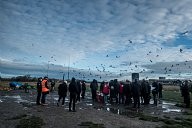
Marlène Schiappa visits Calais
Michael Bunel / Le Pictorium
LePictorium_0256409.jpg
Visit of a camp of Eritrean refugees with Marlène Schiappa, Minister Delegate in charge of Citizenship, visiting Calais. A week ago 27 refugees died in the sinking of a boat trying to reach Great Britain. 01 December 2021. Calais, France.

Marlène Schiappa visits Calais
Michael Bunel / Le Pictorium
LePictorium_0256410.jpg
Visit of a camp of Eritrean refugees with Marlène Schiappa, Minister Delegate in charge of Citizenship, visiting Calais. A week ago 27 refugees died in the sinking of a boat trying to reach Great Britain. 01 December 2021. Calais, France.

Marlène Schiappa visits Calais
Michael Bunel / Le Pictorium
LePictorium_0256411.jpg
Marlene Schiappa talks with migrants during the visit of a camp for Eritrean refugees. Marlene Schiappa, Minister Delegate in charge of Citizenship, visiting Calais. A week ago 27 refugees died in the sinking of a boat trying to reach Great Britain. 01 December 2021. Calais, France.

Marlène Schiappa visits Calais
Michael Bunel / Le Pictorium
LePictorium_0256412.jpg
Visit of a camp of Eritrean refugees with Marlène Schiappa, Minister Delegate in charge of Citizenship, visiting Calais. A week ago 27 refugees died in the sinking of a boat trying to reach Great Britain. 01 December 2021. Calais, France.

Marlène Schiappa visits Calais
Michael Bunel / Le Pictorium
LePictorium_0256413.jpg
Visit of the new storage place for the goods recovered during the dismantling. The place should allow refugees to recover clothes and tents in particular. Marlène Schiappa, Minister Delegate for Citizenship, visiting Calais. A week ago 27 refugees died in the sinking of a boat trying to reach Great Britain. 01 December 2021. Calais, France.

Marlène Schiappa visits Calais
Michael Bunel / Le Pictorium
LePictorium_0256414.jpg
Visit of the new storage place for the goods recovered during the dismantling. The place should allow refugees to recover clothes and tents in particular. Marlène Schiappa, Minister Delegate for Citizenship, visiting Calais. A week ago 27 refugees died in the sinking of a boat trying to reach Great Britain. 01 December 2021. Calais, France.

Marlène Schiappa visits Calais
Michael Bunel / Le Pictorium
LePictorium_0256415.jpg
Visit of the new storage place for the goods recovered during the dismantling. The place should allow refugees to recover clothes and tents in particular. Marlène Schiappa, Minister Delegate for Citizenship, visiting Calais. A week ago 27 refugees died in the sinking of a boat trying to reach Great Britain. 01 December 2021. Calais, France.

Marlène Schiappa visits Calais
Michael Bunel / Le Pictorium
LePictorium_0256416.jpg
Visit of the new storage place for the goods recovered during the dismantling. The place should allow refugees to recover clothes and tents in particular. Marlène Schiappa, Minister Delegate for Citizenship, visiting Calais. A week ago 27 refugees died in the sinking of a boat trying to reach Great Britain. 01 December 2021. Calais, France.

Marlène Schiappa visits Calais
Michael Bunel / Le Pictorium
LePictorium_0256417.jpg
Visit of the new storage place for the goods recovered during the dismantling. The place should allow refugees to recover clothes and tents in particular. Marlène Schiappa, Minister Delegate for Citizenship, visiting Calais. A week ago 27 refugees died in the sinking of a boat trying to reach Great Britain. 01 December 2021. Calais, France.
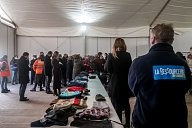
Marlène Schiappa visits Calais
Michael Bunel / Le Pictorium
LePictorium_0256418.jpg
Visit of the new storage place for the goods recovered during the dismantling. The place should allow refugees to recover clothes and tents in particular. Marlène Schiappa, Minister Delegate for Citizenship, visiting Calais. A week ago 27 refugees died in the sinking of a boat trying to reach Great Britain. 01 December 2021. Calais, France.

Marlène Schiappa visits Calais
Michael Bunel / Le Pictorium
LePictorium_0256419.jpg
Visit of the new storage place for the goods recovered during the dismantling. The place should allow refugees to recover clothes and tents in particular. Marlène Schiappa, Minister Delegate for Citizenship, visiting Calais. A week ago 27 refugees died in the sinking of a boat trying to reach Great Britain. 01 December 2021. Calais, France.

Marlène Schiappa visits Calais
Michael Bunel / Le Pictorium
LePictorium_0256420.jpg
Visit of the new storage place for the goods recovered during the dismantling. The place should allow refugees to recover clothes and tents in particular. Marlène Schiappa, Minister Delegate for Citizenship, visiting Calais. A week ago 27 refugees died in the sinking of a boat trying to reach Great Britain. 01 December 2021. Calais, France.
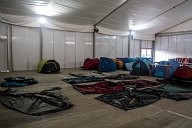
Marlène Schiappa visits Calais
Michael Bunel / Le Pictorium
LePictorium_0256421.jpg
Tents are stored to dry in the new storage place for the goods recovered during the dismantling. The place should allow refugees to recover clothes and tents in particular. Marlène Schiappa, Minister Delegate for Citizenship, visiting Calais. A week ago 27 refugees died in the sinking of a boat trying to reach Great Britain. 01 December 2021. Calais, France.
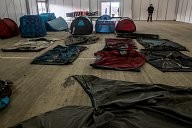
Marlène Schiappa visits Calais
Michael Bunel / Le Pictorium
LePictorium_0256422.jpg
Tents are stored to dry in the new storage place for the goods recovered during the dismantling. The place should allow refugees to recover clothes and tents in particular. Marlène Schiappa, Minister Delegate for Citizenship, visiting Calais. A week ago 27 refugees died in the sinking of a boat trying to reach Great Britain. 01 December 2021. Calais, France.
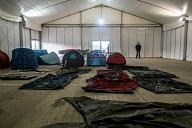
Marlène Schiappa visits Calais
Michael Bunel / Le Pictorium
LePictorium_0256423.jpg
Tents are stored to dry in the new storage place for the goods recovered during the dismantling. The place should allow refugees to recover clothes and tents in particular. Marlène Schiappa, Minister Delegate for Citizenship, visiting Calais. A week ago 27 refugees died in the sinking of a boat trying to reach Great Britain. 01 December 2021. Calais, France.

Marlène Schiappa visits Calais
Michael Bunel / Le Pictorium
LePictorium_0256424.jpg
Tents are stored to dry in the new storage place for the goods recovered during the dismantling. The place should allow refugees to recover clothes and tents in particular. Marlène Schiappa, Minister Delegate for Citizenship, visiting Calais. A week ago 27 refugees died in the sinking of a boat trying to reach Great Britain. 01 December 2021. Calais, France.

Marlène Schiappa visits Calais
Michael Bunel / Le Pictorium
LePictorium_0256425.jpg
Visit of the new storage place for the goods recovered during the dismantling. The place should allow refugees to recover clothes and tents in particular. Marlène Schiappa, Minister Delegate for Citizenship, visiting Calais. A week ago 27 refugees died in the sinking of a boat trying to reach Great Britain. 01 December 2021. Calais, France.
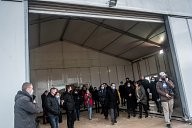
Marlène Schiappa visits Calais
Michael Bunel / Le Pictorium
LePictorium_0256426.jpg
Visit of the new storage place for the goods recovered during the dismantling. The place should allow refugees to recover clothes and tents in particular. Marlène Schiappa, Minister Delegate for Citizenship, visiting Calais. A week ago 27 refugees died in the sinking of a boat trying to reach Great Britain. 01 December 2021. Calais, France.

Marlène Schiappa visits Calais
Michael Bunel / Le Pictorium
LePictorium_0256427.jpg
Visit of the new storage place for the goods recovered during the dismantling. The place should allow refugees to recover clothes and tents in particular. Marlène Schiappa, Minister Delegate for Citizenship, visiting Calais. A week ago 27 refugees died in the sinking of a boat trying to reach Great Britain. 01 December 2021. Calais, France.

Marlène Schiappa visits Calais
Michael Bunel / Le Pictorium
LePictorium_0256428.jpg
Visit of the new emergency shelter for refugees in Calais. 96 beds are installed in 16 tents. A sleeping bag and a toothbrush are placed on the beds. The place should allow refugees to recover clothes and tents in particular. Marlène Schiappa, Minister Delegate for Citizenship, visiting Calais. A week ago 27 refugees died in the sinking of a boat trying to reach Great Britain. 01 December 2021. Calais, France.

Marlène Schiappa visits Calais
Michael Bunel / Le Pictorium
LePictorium_0256429.jpg
Visit of the new emergency shelter for refugees in Calais. 96 beds are installed in 16 tents. A sleeping bag and a toothbrush are placed on the beds. The place should allow refugees to recover clothes and tents in particular. Marlène Schiappa, Minister Delegate for Citizenship, visiting Calais. A week ago 27 refugees died in the sinking of a boat trying to reach Great Britain. 01 December 2021. Calais, France.

Marlène Schiappa visits Calais
Michael Bunel / Le Pictorium
LePictorium_0256430.jpg
Visit of the new emergency shelter for refugees in Calais. 96 beds are installed in 16 tents. A sleeping bag and a toothbrush are placed on the beds. The place should allow refugees to recover clothes and tents in particular. Marlène Schiappa, Minister Delegate for Citizenship, visiting Calais. A week ago 27 refugees died in the sinking of a boat trying to reach Great Britain. 01 December 2021. Calais, France.

Marlène Schiappa visits Calais
Michael Bunel / Le Pictorium
LePictorium_0256431.jpg
Visit of the new emergency shelter for refugees in Calais. 96 beds are installed in 16 tents. A sleeping bag and a toothbrush are placed on the beds. The place should allow refugees to recover clothes and tents in particular. Marlène Schiappa, Minister Delegate for Citizenship, visiting Calais. A week ago 27 refugees died in the sinking of a boat trying to reach Great Britain. 01 December 2021. Calais, France.
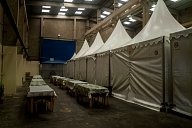
Marlène Schiappa visits Calais
Michael Bunel / Le Pictorium
LePictorium_0256432.jpg
Visit of the new emergency shelter for refugees in Calais. 96 beds are installed in 16 tents. A sleeping bag and a toothbrush are placed on the beds. The place should allow refugees to recover clothes and tents in particular. Marlène Schiappa, Minister Delegate for Citizenship, visiting Calais. A week ago 27 refugees died in the sinking of a boat trying to reach Great Britain. 01 December 2021. Calais, France.

Marlène Schiappa visits Calais
Michael Bunel / Le Pictorium
LePictorium_0256433.jpg
Visit of the new emergency shelter for refugees in Calais. 96 beds are installed in 16 tents. A sleeping bag and a toothbrush are placed on the beds. The place should allow refugees to recover clothes and tents in particular. Marlène Schiappa, Minister Delegate for Citizenship, visiting Calais. A week ago 27 refugees died in the sinking of a boat trying to reach Great Britain. 01 December 2021. Calais, France.

Marlène Schiappa visits Calais
Michael Bunel / Le Pictorium
LePictorium_0256434.jpg
Illustration France terre d'asile. Marlène Schiappa, Minister Delegate in charge of Citizenship, visiting Calais. A week ago 27 refugees died in the sinking of a boat trying to reach Great Britain. 01 December 2021. Calais, France.

Marlène Schiappa visits Calais
Michael Bunel / Le Pictorium
LePictorium_0256435.jpg
Visit of the airport of Marck from where the helicopters fly over the coast. Marlène Schiappa, minister in charge of citizenship, visiting Calais. A week ago 27 refugees died in the sinking of a boat trying to reach Great Britain. 01 December 2021. Marck, France.

Marlène Schiappa visits Calais
Michael Bunel / Le Pictorium
LePictorium_0256436.jpg
Visit of the airport of Marck from where the helicopters fly over the coast. Marlène Schiappa, minister in charge of citizenship, visiting Calais. A week ago 27 refugees died in the sinking of a boat trying to reach Great Britain. 01 December 2021. Marck, France.

Marlène Schiappa visits Calais
Michael Bunel / Le Pictorium
LePictorium_0256437.jpg
Visit of the airport of Marck from where the helicopters fly over the coast. Marlène Schiappa, minister in charge of citizenship, visiting Calais. A week ago 27 refugees died in the sinking of a boat trying to reach Great Britain. 01 December 2021. Marck, France.

Marlène Schiappa visits Calais
Michael Bunel / Le Pictorium
LePictorium_0256438.jpg
Visit of the airport of Marck from where the helicopters fly over the coast. Marlène Schiappa, minister in charge of citizenship, visiting Calais. A week ago 27 refugees died in the sinking of a boat trying to reach Great Britain. 01 December 2021. Marck, France.

Marlène Schiappa visits Calais
Michael Bunel / Le Pictorium
LePictorium_0256439.jpg
Visit of the airport of Marck from where the helicopters fly over the coast. Marlène Schiappa, minister in charge of citizenship, visiting Calais. A week ago 27 refugees died in the sinking of a boat trying to reach Great Britain. 01 December 2021. Marck, France.

Marlène Schiappa visits Calais
Michael Bunel / Le Pictorium
LePictorium_0256440.jpg
Visit of the airport of Marck from where the helicopters fly over the coast. Marlène Schiappa, minister in charge of citizenship, visiting Calais. A week ago 27 refugees died in the sinking of a boat trying to reach Great Britain. 01 December 2021. Marck, France.

Marlène Schiappa visits Calais
Michael Bunel / Le Pictorium
LePictorium_0256394.jpg
Marlène Schiappa the Minister Delegate for Citizenship visits a migrant camp in Calais, they are mainly Eritrean migrants.

Marlène Schiappa visits Calais
Michael Bunel / Le Pictorium
LePictorium_0256395.jpg
Marlène Schiappa the Minister Delegate for Citizenship visits a migrant camp in Calais, they are mainly Eritrean migrants.

Marlène Schiappa visits Calais
Michael Bunel / Le Pictorium
LePictorium_0256396.jpg
Marlène Schiappa the Minister Delegate for Citizenship visits a migrant camp in Calais, they are mainly Eritrean migrants.

Dismantling of the camp of Loon plage
Michael Bunel / Le Pictorium
LePictorium_0256302.jpg
View on a part of the camp. Dismantling of the camp of Loon plage. After the evacuation of the camp of Grande Synthe on November 16, a new camp composed mainly of Kurdish exiles, was installed near Grande Synthe. November 30, 2021. Loon Plage. France
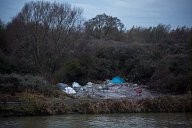
Dismantling of the camp of Loon plage
Michael Bunel / Le Pictorium
LePictorium_0256303.jpg
View on a part of the camp. Dismantling of the camp of Loon plage. After the evacuation of the camp of Grande Synthe on November 16, a new camp composed mainly of Kurdish exiles, was installed near Grande Synthe. November 30, 2021. Loon Plage. France
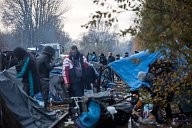
Dismantling of the camp of Loon plage
Michael Bunel / Le Pictorium
LePictorium_0256304.jpg
The refugees collect their belongings while behind them the tents start to be removed. Dismantling of the camp of Loon plage. After the evacuation of the Grande Synthe camp on November 16, a new camp composed mainly of Kurdish exiles, was set up near Grande Synthe. November 30, 2021. Loon Plage. France
Next page
